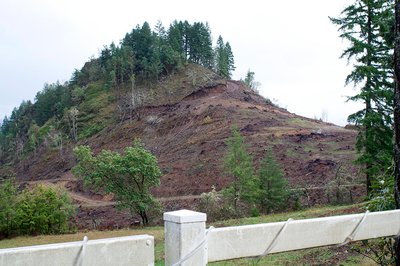
All around Oregon exist areas of land that were zoned for mining back in the 1970s. These mines are sometimes nearly unused or lie dormant for a decade. Homeowners who thought they bought country property in an agricultural area wake up to discover a gravel mine as their loud, new next-door neighbor, and there is often little they can do to stop it or reduce the effects of truck traffic, noise and dust. State Sen. Floyd Prozanski says current mining laws are out of date in Oregon and need to be modernized.
Vaughn Balzer, reclamation specialist for DOGAMI (Oregon’s Department of Geology and Mineral Industries), says in cases like Lost Creek Rock Products’ Parvin Butte in Dexter and the Northwest Mineral Resources mine in Saginaw, opportunities for public input are reduced because the land already has the land-use approval. Mining in Parvin and Saginaw has caused fear and anger for the homeowners nearby who are subject to anything from blasting to the smells of asphalt production.
Balzer says only a small portion of the 900 or so mines DOGAMI handles around the state are controversial. He says DOGAMI is proceeding “slowly and deliberately to make sure we get everything right” as it examines the mining permits. Currently Balzer says the Saginaw mine is in a “holding pattern” and the agency is “still considering input on the permitting process.” Meanwhile Parvin Butte neighbors learned recently that the permit for mining at Parvin, which has been under the aegis of developer Greg Demers and the McDougal Bros., is being transferred to another company, Aggregate Resource Crushing. Balzer says permit transfer, as well as an application to reduce setbacks, is under consideration at DOGAMI.
The Saginaw mine is in Prozanski’s district, and he says he attended a May 6 meeting with Lane County and residents living near the mine where “stuff came out that was somewhat disturbing to me on how the processes work.” He says, “DOGAMI has jurisdiction that’s limited to what they can actually do under current law.”
DOGAMI’s jurisdiction centers on natural resource and environmental concerns, but issues that trouble the neighbors, such as the numbers of trucks on the rural roads, fall under county. The Saginaw mine lies close to a Head Start school, and Parvin lies in the middle of a small rural community.
Prozanski says he and Rep. Phil Barnhart introduced several bills in the 2013 legislative session aimed at improving mining practices and increasing public input but none made it out of committee. With input from DOGAMI and others, he will introduce new legislation in the next session aimed at taking into account the way land use has changed since the zoning was done in the ’70s.
Prozanski says that under current law, if a mining operation is out of compliance with the state and then comes into compliance, “my understanding is that DOGAMI can’t take that into consideration when new applications are made for that site.” As a prosecutor, he finds that unbelievable and adds, “We use criminal history in determining appropriate sanctions for that person, but a company that has been in violation of state law on multiple occasions, if they come into compliance, those past acts aren’t considered in granting the permit.”
The state senator says the next goal is to reconvene a time for DOGAMI, the county and constituents to have a roundtable discussion “and start looking at what is it we can do so that the most affected can have a part in these discussions.”